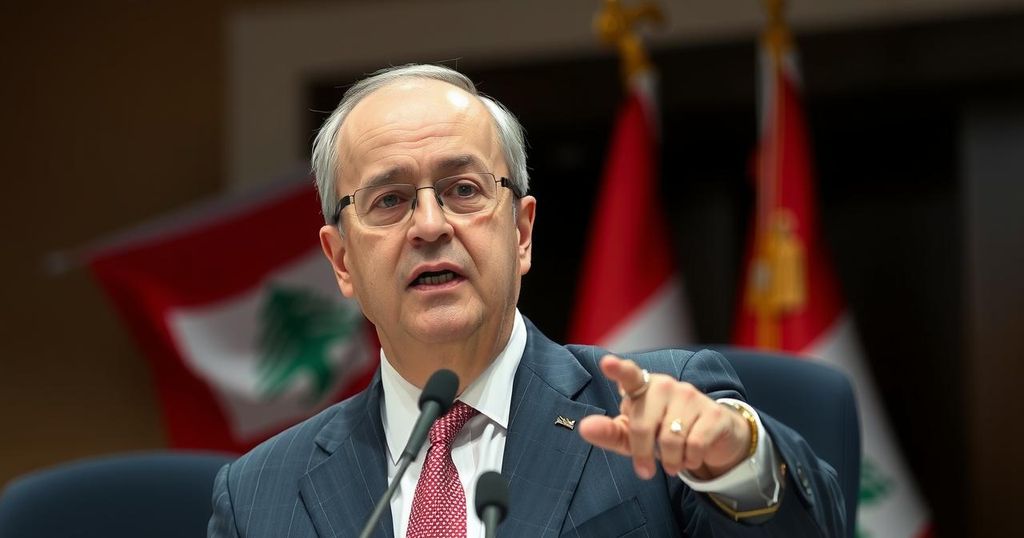General Joseph Aoun’s election as Lebanon’s president signifies a significant defeat for Hizbullah, highlighting its declining influence. His presidency comes with immediate challenges, including stabilizing southern Lebanon and forming a new government. Aoun’s leadership has garnered international support, raising hopes for Lebanon’s reconstruction and stability. Nonetheless, resistance from Hizbullah and other factions may complicate his efforts as he navigates a fragile political landscape.
The recent election of General Joseph Aoun as Lebanon’s new president signifies a notable decline in the political power of Hizbullah. Senior security officials have heralded this event as a consequential defeat for the group, which was unable to secure the presidency for its chosen candidate, Suleiman Frangieh, despite a lengthy two-year delay. Frangieh’s withdrawal of candidacy and subsequent endorsement of General Aoun is viewed as a pivotal shift in Lebanon’s political landscape, further undermining Hizbullah’s influence, which was already challenged by Israel’s military victories in the region.
In addition to Hizbullah’s setback, this election is poised to generate increased international pressure on Israel to finalize its withdrawal from southern Lebanon. With backing from international powers such as the United States, France, and Saudi Arabia, General Aoun’s presidency is expected to bring new dynamics to Lebanon’s political framework. Senior envoys from Gulf countries are likely to visit Beirut, and Aoun is scheduled to make an official trip to Saudi Arabia, highlighting the regional significance of his election.
Upon taking office, General Aoun faces immediate challenges including stabilizing the ceasefire in southern Lebanon and forming a new government to address Lebanon’s pressing issues. He must oversee the deployment of the Lebanese army to ensure compliance with ceasefire agreements while also initiating political consultations to form a cabinet aimed at reconstruction efforts following years of conflict. UN Resolution 1701 provides a framework for these initiatives.
In his victory address, General Aoun has expressed determination to disprove skeptics regarding his capacity to curtail Hizbullah’s military capabilities. However, significant concerns remain over his ability to halt the smuggling of weapons from Syria and funds from Iran to Hizbullah, which is critical to the stability of his administration. Political reactions in Jerusalem indicate apprehension that his presidency may accelerate international calls for an Israeli withdrawal from southern Lebanon, underscoring the delicate political balance Aoun must navigate.
General Aoun’s election seems to result from substantial international pressure on Lebanon’s political apparatus. Although facing substantial opposition within parliament, he secured the presidency, yet his administration is likely to encounter resistance from Hizbullah and other allied factions that previously held key positions in governance. There is anticipation that Hizbullah and the Shia Amal movement will assume critical roles in the new government despite their recent setbacks.
As public sentiment leans towards optimism regarding General Aoun’s leadership potential, the reality remains fraught with challenges. His success will largely depend on his ability to manage domestic pressures and international expectations while fostering new partnerships that can propel Lebanon toward political stability and economic recovery. The hurdles ahead are steep, but there exists a glimmer of hope that Aoun’s presidency might signify a turning point in Lebanon’s tumultuous political history.
The political atmosphere in Lebanon has long been influenced by the ongoing power struggle involving Hezbollah, a significant player in Lebanese politics with ties to Iran. The recent election of General Joseph Aoun as president comes after a prolonged political vacuum and underscores shifts in power dynamics. His rise is perceived as a decline of Hezbollah’s influence, exacerbated by regional and international geopolitical games that have a direct impact on Lebanon’s internal politics and stability. The election not only reshapes domestic governance but also affects Lebanon’s relations with neighboring countries and international stakeholders.
In conclusion, General Joseph Aoun’s election as Lebanon’s president marks a critical juncture in the political landscape, symbolizing a decline in Hizbullah’s power and the potential for new international collaborations. Addressing immediate challenges, such as stabilizing military ceasefires and forming an effective government, will be essential for Aoun’s success. However, entrenched opposition and regional dynamics will pose significant barriers to his administration. The path ahead holds both opportunities and considerable risks for the future of Lebanon.
Original Source: jcpa.org






